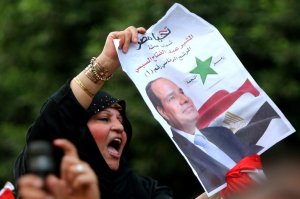
There are some analysts in the West who suggest that the election victory of the former minister was a step back to an era that is vehemently opposed to by those supporting the ideals of the Arab Spring. But that hardly sounds convincing. In the course of the “Arab Spring” there occurred a powerful and largely spontaneous explosion of protest energy by the masses forcing from power the former authoritarian leader. In the maelstrom of events, Islamists, especially the “Muslim Brotherhood” managed to ride the rush of the masses eager for social justice and political reform to come to power.
But the euphoria felt by the citizens was soon dashed due to the inability of the Islamists to change the situation for the better and eventually morphed into a crisis of confidence and general disappointment. The country began to turn unpredictably in the direction of conflict on religious and other grounds.
Under pressure from mass protests, the Islamist president was deposed by the Army under the auspices of El-Sisi. It has happened previously in the modern history of Egypt. In 1952, the year after the overthrow of the monarchy, the takeover by the Army proved effective as a consolidating force in policies to the modernization of the country. The Army as an institution accounts for at least one third of the Egyptian GDP.
It is indicative that out of six presidents of the country, five come from the ranks of the military. According the opinions of observers, many ordinary Egyptians, seeing the chaos in neighboring Libya and due to the collapse of the power base and the war in Syria, they linked their hopes to El Sisi believing he could provide the country with security and stability.
It is not without good reason that more than 23 million Egyptians voted for him; and although banned in Egypt, “The Muslim Brotherhood” called for a boycott of the elections. You recall that in 2012 more than 13 million people voted for Mohamed Mursi.
Consequently, with presidential elections set for Egypt, there began a construction of a new power structure, one that would replace the old which had been undermined by the Arab Spring. Last year a Constitution was adopted, the new electoral laws implemented, and now, after the election, Egyptians vote for a new parliament.
The challenges confronting the new head of the largest country in the Arab world are serious. These include attempts at improving the economy, battling extremism and a divided society which has experienced multiple painful shocks, etc.
El-Sisi must patiently and systematically undo deeply rooted problems and conflicts that have gone unsolved for decades. Among them in particular is the problem of youth employment which is hindering development. It has often served as fuel for riots in the hands of all sorts of radicals.
Among the foreign policy priorities of Cairo, securing a stable and lasting image of the state that meets the challenges of security in the Middle East, covering disasters as well as a resolution to the Israeli-Palestinian conflict are vital. This is critical from the point of view of the overall attractiveness of Egypt as a destination for foreign investment and the restoration of confidence of its creditors and its reputation in the eyes of foreign tourists.
Most important from Russia’s perspective is, who will be at the helm of the key countries in the Arab world with which Russia has developed and established relationships for over 70 years.
Recently in Egypt the country marked the occasion of the fiftieth anniversary of the construction of the Aswan Dam. It is one of the largest in the world and was built with the technical support and assistance of the USSR. Aswan Hydro Complex was the flagship of all the economic and industrial initiatives that laid the basis for the modern infrastructure of the country. This bilateral cooperation contributed to Egypt’s overall forward economic progress, but was eventually followed by an economic downturn. Nevertheless, the legacy of this partnership is true today, but under new conditions that take into account the transformations in Egyptian society as well as to the surrounding region.
The commitment to this heritage is routinely spoken about in countries at various levels. In particular, at the meetings in the format of “two plus two”, where recently the foreign ministers and defense ministers of Russia and Egypt first met in the autumn of 2013 in Cairo. The second such meeting was this past February in Moscow. The defense minister of Egypt El-Sisi and the Foreign Minister H. Fahmy attended. It was the first foreign visit for El-Sisi.
I would like to draw your attention to the arrival in Russia in recent months of a number of delegations and national diplomatic initiatives from the banks of the Nile. They included veterans of politics and business, in addition to prominent representatives within the media. It was about the new vision for a mutually beneficial relationship between the two countries.
Yuri Zinin is a Senior Researcher at MGIMO and a regular contributor to the online magazine “New Eastern Outlook”
